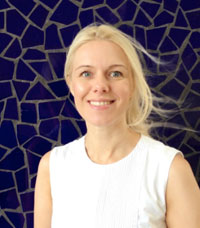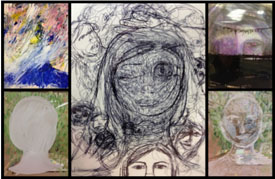Q&A with Victoria Scotti
January 29, 2015
Victoria Scotti, a PhD candidate in the Creative Arts Therapies program, was just awarded the Estonian Student Scholarship for the second year in a row. Along with classmate Angela Aicher, Scott is co-authoring an article on arts-based research.
Describe yourself and your involvement as a student?
 I am a PhD Candidate in the Creative Arts Therapies program at Drexel. I am in my third year of the PhD studies and currently focusing on my dissertation research. In the first two years of my studies, I combined coursework with assistantship experiences. I was fortunate to learn from outstanding professors at Drexel through both research and teaching assistantships. I believe that these experiences prepared me well for a future in academia.
I am a PhD Candidate in the Creative Arts Therapies program at Drexel. I am in my third year of the PhD studies and currently focusing on my dissertation research. In the first two years of my studies, I combined coursework with assistantship experiences. I was fortunate to learn from outstanding professors at Drexel through both research and teaching assistantships. I believe that these experiences prepared me well for a future in academia.
I believe that involvement in the department and collaboration with other students are a great way to learn from each other. I have co-authored articles with my classmate Angela Aicher, and also with our department’s first alumna Gioia Chilton, PhD, who has become an expert in arts-based research and to whom I am grateful for her support and guidance. I am also trying to support incoming students through our department’s mentorship program. The purpose of this program is to assist incoming PhD students with the transitioning to graduate school. For me, the PhD program is very inspiring: the interdisciplinary, studio, and research courses opened my world but at the same time, I am aware that the first year of the PhD studies can be overwhelming at times. Last year, I served as a mentor for an incoming student, and offered my assistance in more practical matters as well as offered empathy and emotional support. I feel grateful for the experience because it was an opportunity to get to know her and help an incoming student.
How did it feel to be awarded the Estonian Student Scholarship for the second year in a row?
This is a prestigious scholarship that is a great honor to receive. The scholarship was awarded by the Estonian Students’ Fund in the USA. This fund supports and acknowledges Estonian students’ educational pursuits, and this support has been made possible by generous donors from the Estonian community in the USA. Estonia is a small European country where art therapy is a relatively new discipline but it is developing fast and is now being offered at the Master’s level at Tallinn University. I have witnessed the birth of the profession in Estonia, and by teaching continuing education courses at Tallinn University hope to continue to contribute to the growth of Art therapy there.
What aspects of arts based research have you been studying?
This year, I am working on two arts-based research projects: One is my own dissertation study, and the other is my practicum with a renowned arts-based research expert Dr. Patricia Leavy.
My dissertation study focuses on the aesthetic experiences of women in their transition to motherhood. I have been developing a specific arts-based research method that uses the visual arts technique of portraiture for the purpose of data generation and analysis. This has been an exciting journey that is yet to continue!
Another project is my research practicum with an arts based research expert Dr. Patricia Leavy who writes fiction as research and is the editor of several handbooks on arts based and qualitative research methods. During my practicum, I am assisting Dr. Leavy with several innovative projects. At this point, perhaps I could mention two projects here. I serve as an Associate Editor of a new arts-based research journal that is being founded by Dr. Leavy and Dr. Conrad. This innovative journal, titled Art/Research International: A Transdisciplinary Journal is a much needed forum that publishes arts-based research articles. The contents of this open-access journal will be available to everyone online free of charge. The journal will support photo and video submissions thus permitting to publish arts based work in different media such a visual arts, drama, music, dance, etc. This is truly great news to arts-based scholars!
Another innovative project that Dr. Leavy and I are collaborating on is joining visual arts and writing in data analysis and representation phases based on interview data about women’s identity, relationships, and body image. We are both very excited and inspired by this collaboration, and hope that this will result in a multimedia project.
Do you enjoy the research on which you are working?
I love the research on which I am working!
What did you find surprising, if anything, about the research?
Because creativity and art making is inherent in arts-based research, this type of research is full of surprises due to the diversity of the participants’ creative expression and voices. In addition, I am constantly surprised by my own artistic responses to the data that I am analyzing. I see my work as collaboration between myself and the research participants. By creating visual representations, I help the participants’ stories become visible.
What is your advice to students interested in doing arts based research?
 I think that the best way to learn about arts-based research is to start with the artistic inquiry of one’s own experiences. I had an opportunity to do this at Drexel by taking a class called self-other artistic inquiry in the studio. This is a module in the Creative Arts Therapies PhD curriculum that runs throughout the four quarters of the first year of studies. Every week, the students use creative arts such as visual arts, music, dance, or the combination of them to intrinsically explore aesthetic, intersubjective, embodied, and imaginal human experiences that are difficult to put into words or even to be aware of. For example, such phenomena are transference and counter transference that are sensed between people and affect how people perceive each other. My classmate Angela Aicher and I decided to explore these phenomena collaboratively using artistic inquiry, and wrote an article about this collaborative journey.
I think that the best way to learn about arts-based research is to start with the artistic inquiry of one’s own experiences. I had an opportunity to do this at Drexel by taking a class called self-other artistic inquiry in the studio. This is a module in the Creative Arts Therapies PhD curriculum that runs throughout the four quarters of the first year of studies. Every week, the students use creative arts such as visual arts, music, dance, or the combination of them to intrinsically explore aesthetic, intersubjective, embodied, and imaginal human experiences that are difficult to put into words or even to be aware of. For example, such phenomena are transference and counter transference that are sensed between people and affect how people perceive each other. My classmate Angela Aicher and I decided to explore these phenomena collaboratively using artistic inquiry, and wrote an article about this collaborative journey.
Tell us a little about the article on which you’ve been working?
The article that we wrote collaboratively is based on our artistic inquiry about transferential phenomena that concern the self and the other and the relationship between the two. These transferential phenomena exist intangibly and are mostly unconscious, therefore, they are difficult to put into words. We decided to use art to make them visible. Over the period of 10 weeks, we jointly painted self-portraits. What made this work collaborative was that instead of each sitting in front of a canvas, we chose a transparent canvas (transparent acetate sheets) and placed it between us. This way, while painting my own portrait, I saw what Angela painted, and I also saw her through the transparency. As a result of this inquiry, we unveiled transferences and counter transferences between us, which helped us get to know each other on a deeply intimate and emotional level. To represent our findings, we created an audio-video compilation that we embedded in our article. I am so glad that we were able to include a hypermodal component in our article so that readers and viewers can experience the more embodied and emotional aspect of this inquiry that would have been very difficult to convey by words alone.
This is a collage compilation of some of the collaborative self-portraits that we created.
How would you rate your overall experience of Drexel's graduate programs?
The PhD program in Creative Arts Therapies is an excellent program, I couldn’t be happier with my experience. I chose this program because of the very personal and supportive guidance that I receive from my advisor Nancy Gerber, PhD and our dedicated faculty who are all distinguished professors, scholars and clinicians. I am particularly pleased with the emphasis that our program has on innovative and emergent research methods such as mixed methods and arts-based research that are taught as part of the research coursework, and that students can utilize in their own dissertation studies. As part of the coursework on research methods, I have been able to participate in research conferences where I have been able to learn directly from experts. I am also very happy with the assistantship and practicum experiences that are a great preparation for a future academic position.
By: Mahmoud Shurbaji ‘15